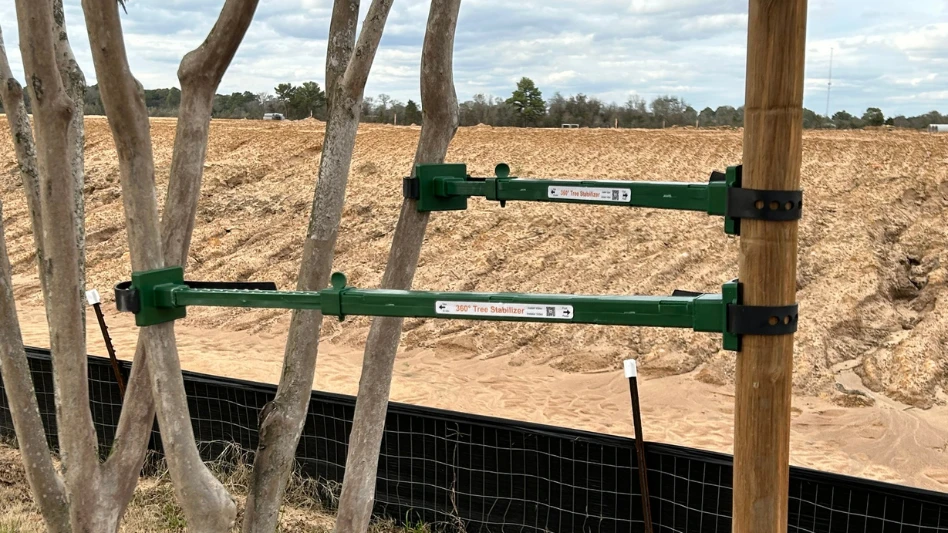
Land Program Manager Lori Zatroch of Cuyahoga Community College found their horticulture program’s future stationed in the middle of Wisconsin.
No, they weren’t planning on relocating the two-year university from its home in Cleveland; instead, they visited Mid-State Technical College for a tour. They wanted to see a school that had already built a facility similar to what Tri-C hoped to create in Ohio. Jim Funai, associate professor, says the Mid-State officials offered plenty of advice, and over the course of several days, he and Zatroch took detailed notes on what things they’d like to bring to their campus.
Back home, Tri-C has been changing the perception about their school and careers in horticulture in general. When Funai arrived in 2009 after years working in the industry, he admitted that he didn’t know Tri-C existed. The program struggled to get more than three students in a class, but now they’ve grown so rapidly that they’re adding a new facility and new classes. The school is adding to a sterling reputation built upon vigorous, hands-on classwork that’s helped plenty of students secure great jobs right after graduation.
“We’re not just going to talk about it,” Funai says. “Here, we’re going to do it. If they can go into an employer and say they know how, that’s going to be pretty huge.”
But Tri-C is an anomaly. Most schools across the country are shrinking, not expanding, let alone gutting their classrooms to add updated technologies and improved training facilities. Through a focus on aggressive recruiting and a series of helpful grants, Tri-C is bucking the downward trend in horticulture education.
GOOD AS NEW.
Just a few months prior to that Wisconsin visit, Cuyahoga County voters passed a 25-year, 0.5 mill-bond that was intended to improve and repair facilities across all Tri-C campuses. Funai says that apparently, he and Zatroch had proved vocal enough about how much the horticulture program needed a new facility that Tri-C prioritized giving them one.
The school has since broken ground on its Plant Science and Landscape Technology Learning Barn, which is going to be a 2,200-square-foot workspace that’s prominently placed on a part of Tri-C’s Eastern Campus. Right in the center of the facility will be a rustic timber pole used to practice climbing and rigging in arboriculture classes.
Right now, Funai says half of the Tri-C curriculum incorporates hands-on exercise, but there are severe limitations. He says the students will often practice hardscaping in a parking lot and need to pack up at the end of class, or they’ll do assignments in the freezing cold and a foot of snow. With the new facility, the curriculum will ease into far more hands-on exercise.
“This facility changes everything we do for hands-on,” Funai says. “Now, you’re dodging the weather and planning for that. It’s been a logistical nightmare. We pulled it off, there’s good lessons learned – it’s not always the lessons I wanted to have them learn – there’s just so much out of your control. This building will bring back into control the lessons we need to learn for that particular day.”

SPREADING THE WORD.
Former student McKenna Rowles, who graduated last year and has since gone on to become an irrigation crew field manager, says her background knowledge from her time at Tri-C has already become invaluable. She says she one of several alumni who proudly talk about their two-year program, even when comparing college experiences with folks who graduated from a more prominent four-year university.
“I have the background of so many things,” Rowles says. “The fact that I know it is what put me ahead, and that is all thanks to Tri-C. You can’t know enough.”
What Funai, Zatroch and others say about the program outside classroom doors is another element to Tri-C’s resurgence. They’ll go to local high schools to proactively recruit instead of waiting for interested students to come to them. Funai says many students don’t even know there are job opportunities in horticulture, nor do they acknowledge that they can go to a two-year school instead of a four-year university to earn their degrees.
Without seeking those kids out, they may never recognize their interest in horticulture could become a lucrative career.
“Just because you get dirty doesn’t mean you’re dumb.” Jim Funai, Tri-C associate professor
“I just don’t know if people are spending enough time with those kids helping them to understand there’s a pretty sweet career (in landscaping),” Funai says. “If no one’s telling them, they’re not going to stick around. Turns out you can actually make a living doing this. Who knew?”
Funai says he’ll often bring his own students to career fairs or visits so that the high school students can chat with somebody closer to them in age. He also says he hosts open classes from time to time, inviting interested students to spend the day observing what Tri-C does with their students.
During the more formal pitches, however, Funai informs students that there’s nothing wrong with getting a degree in horticulture. He brings attention to the industry’s worst stigma and debunks it, which is something he says other school’s recruiters don’t often do.
“A lot of times we almost apologize for what we do,” Funai says. “Like, well, you know, I’m just a landscape contractor. Quit apologizing. I’m a professional, I work with my hands and I’m outside. I get dirty. I’m also really smart, and I love it. So, how do you like that? We don’t have to apologize for this. Take great pride in what you’re doing because it’s an honorable thing what you’re doing. Just because you get dirty doesn’t mean you’re dumb.”

MONEY TALKS.
Ultimately, the passed levy wasn’t the only money Tri-C needed to expand its horticulture program and nearly double its enrollment numbers. Funai has received a plethora of grants that’ve helped boost their school, and he says they’re easier to apply for than most people are willing to admit. Sure, it takes effort, but the benefits to their program have been sizable.
These grants allowed for more diversity in the types of classes Tri-C offered, which helps students specify what they want to get into once they graduate.
For instance, Tri-C picked up a grant named after former Ohio state senator Carl Perkins, which helped them buy an air spade to help analyze tree health, as well as a wood chipper to teach students safety. Other grants helped them buy drones to show students defects in trees that they should avoid before they climb them.
Just recently, STIHL and the Tree Care Industry Association teamed up and selected Tri-C as one of five schools out of roughly 60 to earn a voucher for $5,000 in STIHL equipment. The equipment is specifically designed for smaller women who might otherwise feel discouraged from arboriculture because many tools are noticeably heavier.
“I swear, I almost cried when I heard that one,” Funai says. “It’s not going to buy you a ton of stuff, but holy crap. That’s going to update what we have for training big time. That was $5,000 we were never going to have to spend.”
Changing Perceptions: Funai says Tri-C has emphasized with local high school students that there are lucrative career options in horticulture.
THE NATIONAL STAGE.
When Rowles graduated from Tri-C last May, she applied to many open landscaping jobs where the employers already knew her. She ultimately landed at Ruppert Landscape in Raleigh, North Carolina – a gig she says she might not have landed without the National Collegiate Landscape Competition.
The annual contest pits students against each other in various categories like hardscape installation, plant problem diagnosis and compact excavator operation.
Tri-C finished fourth overall last year, and Rowles finished third out of more than 700 competitors across the contest. She was the highest finisher by somebody who attended a two-year school.
Companies that attended NCLC took notice, which is coincidental because Rowles was initially hesitant to even join the NCLC team.
It was only at the urging of Funai and her classmates that she finally decided to participate, and once she got hooked, she and her peers often eagerly practiced. They came in on weekends to work outside, even over the winter, but the work pays off so long as students network at the competition.
“I’ve been in this industry for four years, give or take, and I am way more advanced than most irrigation techs, field managers, you name it, because of the hands-on stuff. It was crazy to be able to take exams and then go out and do it,” Rowles says. “The whole picture is that I wouldn’t have these opportunities that I have now if I didn’t go to Tri-C. People say it’s all about who you know, and that’s very true. Tri-C has made me personally very successful.”
Funai says Tri-C “lays down the hammer” when it comes to the competition, asking students to sign a document pledging their effort to practicing. In their first year of participating, the school sent four or five students. For this March’s NCLC in Colorado, they’ll send a record 20 students.
“That’s probably part of our momentum as well. We really dedicate our team to being successful at that national competition,” Funai says. “As we go out and recruit and we can tell that to people, ‘Yeah, I get it. We’re a community college. Turns out, we’re the top two-year program in the nation, we’re in the top 10 every year overall.’ So honestly the big difference here is, you pay a hell of a lot less money to come to our school.”

Explore the April 2019 Issue
Check out more from this issue and find your next story to read.
Latest from Lawn & Landscape
- From Design to Proposal: Estimating and Rendering Support Services
- PERC adds Joel Stutheit as senior manager of business development
- The National Collegiate Landscape Competition is underway
- Keeping clients happy during the Super Bowl
- PBI-Gordon launches Field Development Team
- The New World Is Green: Grow With Marketing Analytics & AI
- Exmark launches autonomous commercial mower
- North by Northwest's charitable act for the Ronald McDonald House Charities





